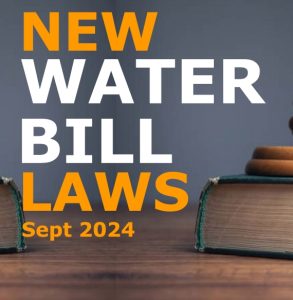New laws have recently been passed by the Queensland government relating to the payment of water bills by tenants.
The main change has been a strict timeframe imposed on landlords in which they can expect a tenant to pay a water bill.
In a nutshell, from 30th September 2024, a landlord has only 4 weeks after they receive a water bill to pass it onto a tenant to pay. If the bill is passed to the tenant after the 4 week period, the tenant does not have to pay the bill. This change has come about because some landlords hoard the bills and then pass them all onto the tenants in one go – which causes financial stress to tenants.
Most of our landlords redirect their water bills to our office, so we receive them, we pay them and then we pass the bills onto the tenants. Landlords who have the bills sent to themselves first, run a higher risk of missing the 4 week deadline – especially if the landlords receive water bills and correspond with us by letters rather than email.
Other landlords choose to avoid the water issue all together, by not charging tenants for water, but instead increasing the rent to cover the costs.
To avoid all potential problems, we highly recommend that all landlords have their water bills redirected to our office for payment, where we will ensure water bills are paid and forwarded to tenants within the 4 week time frame, or don’t charge tenants for water but charge higher rents.
BUT – CAN LANDLORDS LEGALLY CHARGE TENANTS FOR WATER AT ALL?
Whether or not a landlord can legally pass on water charges to tenants can be tricky, and owners, tenants & property managers (not us) get it wrong all of the time.
The penalties for landlords (and agents) charging tenants for water when they are not legally allowed to do so are HUGE – so it is important that things are done correctly.
Landlords are allowed to pass on the full water consumption charges (including bulk water charges) to tenants IF and ONLY IF they can meet all 3 of the following criteria:
- the rental premises must be individually metered (or water is delivered by vehicle), and
- the rental premises must be water efficient, and
- the tenancy agreement states the tenant must pay for water consumption.
The tricky bit here is what is meant by the rental premises must be ‘water efficient’.
A rental premises is considered water efficient if the landlord can prove certain water fixtures meet the following standards:
- Internal cold water taps and single mixer taps (excluding bathtub taps and taps for appliances such as washing machines) must have a maximum flow rate of nine litres per minute.
- Showerheads must have a maximum flow rate of nine litres per minute.
- Toilets must have a dual flush function not exceeding six point five (6.5) litres on full flush and three point five (3.5) litres on half flush and a maximum average flush volume of four litres (based on the average of one full flush and four half flushes).
The requirement for taps (see point 1. above) applies only to internal cold water taps that are installed over a hand basin, kitchen sink or laundry trough (including single mixer taps). The requirement does not apply to other taps in the premises such as bath tub taps, outside taps for the garden, or taps which supply washing machines or dishwashers. These taps are not required to be water efficient.
The easiest way to prove a property is water efficient, is to engage a plumber to test the property and provide a water efficiency report. This report will be the first thing asked for if there is a dispute.
If a landlord is able to charge a tenant for water, the tenant can be charged:
- State Bulk Water Charges
- Water Usage Charges
The tenant cannot be charged for:
- Sewerage Usage Charges
- Fixed Access Charges (including Water and Sewerage Access Charges)
Water sub-meters, landlord expectations for tenants to water lawns, changes to taps etc after a tenancy has commenced, leaking pipes, new granny flats etc all make the water charging discussion much more complicated.
Rather than charging tenants for water and going through the hassles of water efficiency certificates, recording water meter usage, calculating various consumption costs, and chasing tenants to pay their portion etc, some landlords simply charge a higher rent and don’t worry about charging tenants for water at all.
Our agency always ensures water is charged to tenants correctly. This protects the tenants from being overcharged, protects landlords from missing the 4 week tenant timeframe spoken about above, and protects landlords (and ourselves) from heavy financial penalties.
As always, our property managers are the first person a landlord should contact if they have concerns about water charges to tenants. Give your property manager a call – they’d love to hear from you!

